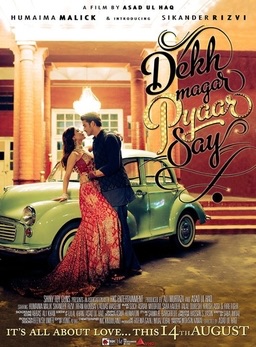Dekh Magar Pyaar Say
Dekh Magar Pyaar Say 2015 Film Budget, Box Office, Verdict, Release Date, Detail (Directed by, Starring by, Writer) and Story Overview

Detail
- Budget: — Crore
- Box Office: 2.42 Crore
- Box Office Verdict: —
- Release Date: 14 August 2015
- Directed by: Asad UL Haq
- Starring by: Humaima Malick, Sikander Rizvi, Irfan Khoobsat, Amna Ilyas
- Writer: Saba Imtiaz
Movie Overview
Dekh Magar Pyar Se got positive reviews for good heading, acting and applause for its music. The film was for the most part shot in Lahore over a 45-day time frame.
The most grounded topic in Dekh Magar Pyaar Say is its cutting edge look and a solid, innovative storyline, tied down in a particular and amusingly watched reality. It happens in a romanticized rendition of the world. Lahore, the social capital of Pakistan gives the setting to a light, exquisite yet complex sentiment, which incorporates components of imagination with all the negative components magicked away. Dekh Magar Pyaar Say is the tale of Annie (Humaima Malick), a young lady who carries on with an existence of make conviction. She has a characteristic endowment of easily finishing existence with a characteristic style of excellence and charm, making her creations so incredible that infrequently even she can’t resist the urge to go too far among the real world and fiction. Be that as it may, her reality isn’t without ‘rude awakenings’ as not every one of her plans function as flawlessly as she trusts. After a progression of undertakings including capricious characters, by a touch of destiny, Annie goes over an aspiring and clever rickshaw driver who is known by the name of ‘Billa’
Dekh Magar Pyaar Say offers a fascinating artistic encounter for the individuals who are unenlightened to Pakistani film. This isn’t a ludicrous, sumptuously mounted bollywood masala flick – it has a few sensibilities of a free film, for example, an author assuming control over the symbol of a screenplay/discourse essayist, and obtains in its account style and visuals from contemporary western film. A few successions, for example, the 50s themed routine arrangement (“Tauba”) are sufficiently strange to let it haul into the more exploratory domain.



